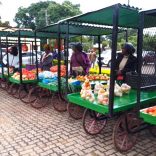Mozambique: Profits of three largest banks fell more than 31% in 2024
Gates and Odebrecht want to produce chickens – By Joseph Hanlon

.lse.ac.uk (File photo) / Joseph Hanlon
Bill Gates Tuesday (7 June) announced a plan to donate chickens to Africans to turn them into commercial farmers. Gates said a farmer starting with five hens could earn more than $1,000 a year. Fewer than 2% of farmers in Mozambique earn that much money.
Meanwhile, Odebrecht, the large Brazilian construction company which built Nacala airport and is building the Maputo bus rapid transit system wants to build an $82 million installation to produce one quarter of Mozambique’s chickens. The company would go from field to fork, producing maize and soy for feed; having a hatchery, slaughterhouse and processing plant; and marketing. It would be located north of Mocuba, Zambezia. Odebrecht has already received $550,000 from the Agriculture Fast Track Fund (set up by the US, Sweden and Denmark) and the Africa Development Bank. It hopes to raise money from the World Bank’s International Finance Corporation. If successful, the project put out of business thousands of Mozambican small commercial chicken producers, who could not compete. Is this really the best way for the World Bank and African Development Bank to promote development?
But could either succeed? A large integrated project of the type produced by Odebrecht has never succeeded in Mozambique; indeed, all large agricultural plantations have failed. And on 9 March, Marcelo Odebrecht, the boss of the construction company, was jailed for 19 years for corruption.
Bill Gates, on the project’s web page, says chickens “are easy and inexpensive to take care of.” That has not been the experience in Mozambique, where commercial chicken raising has proved difficult. In our book “Chickens and beer: A recipe for agricultural growth in Mozambique” we looked at the successful value chain for soya and chickens. Eight years ago, local chickens were more expensive in the market than imported frozen Brazilian or South African chickens. It has taken a decade of work by TechnoServe and others to promote local soya production and bring the cost of chicken production down to competitive levels. This works only in a tightly controlled system. Several larger local chicken companies are profitable, and Novos Horizontes in Nampula is successfully promoting outgrower schemes. Keeping costs down, even for family producers, means 1) buying day old chicks and not hatching eggs (which is quite complex for commercial production), 2) having the right food and feeding regime so chickens grow fast enough, and 3) have disease control to limit losses. Of course families have chickens scratching around the yard and some eggs hatch and some chickens grow, and this works well for family consumption – but it is not commercial. No one will make $1000 a year that way.
Indeed, a very common use of the “7 million” rural development funds has been in the form of grants to people to start chicken production, because, with Bill Gates, people think it is “easy”. But nearly all fail, because it is so hard both to keep costs down and to ensure a market. Having to feed the chicken for just one extra week wipes out all profit.
Mozambique has succeeded in tightly controlled small scale chicken production. Should development banks support Odebrecht to replace those successful producers?
And, so far, just giving people a few chickens has been fine for family consumption, but has always failed to become commercial. Has Gates discovered something new?
Neither Gates nor his partner Heifer International have said if the programme will be run in Mozambique.
Gates: https://www.gatesnotes.com/
Odebrecht: http://www.aftfund.org/en/
Chickens and beer:
By: Joseph Hanlon












Leave a Reply
Be the First to Comment!
You must be logged in to post a comment.
You must be logged in to post a comment.